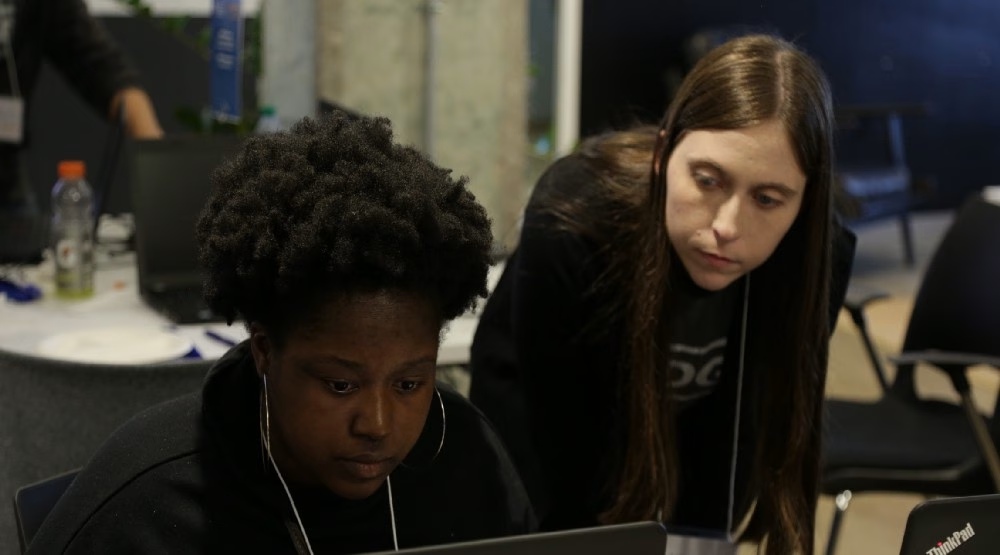A recent event co-hosted by the ESA Foundation and Amazon Games in Washington, D.C., enabled students like Kayla Harwell to create video games with professional help.
By Rich Shea
November 26, 2019

Kayla Harwell has been to a lot of hackathons, those day- to days-long computer programming events in which participants tackle everything from improving existing applications to designing video games. Curious about her career options, the computer-science (CS) sophomore at Howard University attends as many as she can. “Usually, everybody in CS goes into software development,” she explained recently. “But I want to broaden my horizons, so I’m looking into game development and seeing if that’s a path I want to take.”
With that in mind, Kayla attended a hackathon-turned-game jam co-hosted by the Entertainment Software Association (ESA) Foundation and Amazon Games in Washington, D.C., last month. The “Lumberyard Hackathon,” named for Amazon’s game engine, challenged local high school and college students to use the company’s Script Canvas platform to design the basics of a future-focused video game and “sell it” to judges in just one day. The event took place in The Alley, a state-of-the-art workspace donated, for the day, by Verizon 5G.
For Kayla, it was not only an enlightening experience; it far outshined other hackathons she’s attended. “I just want to point out the fact how intimate this hackathon is, and how that really translates into helping the attendees learn and create connections later on,” she said.
Kayla was on one of several student teams which, early in the day, were given tutorials on Script Canvas by a handful of Amazon Games experts, ranging from engineers to creative directors, who later served as judges. The experts’ principal role, however, was mentor. During the game jam that followed, they prodded, guided and encouraged the students to create games imagining what the world might look like in the not-too-distant future.
“They’re not here to judge you or make you feel stupid,” Kayla said of the Amazon experts. “They understand that you don’t have a base knowledge of what we’re doing here, and I can tell that they’re really genuine in the fact that they want us to learn.”
“I want to create something that’s timeless, a great experience like, let’s say, ‘The Last Of Us’ – a great storyline, great gameplay.”
Kayla was attending her second ESA Foundation/Amazon Games event. The first took place in February, when the goal was to develop a Twitch extension tool. “But this is a full-blown visual storyline,” she said. “So that’s the thing I’m really learning from my teammates — because three of them are computer-science majors, but one is an actual game-design major. I’m learning a lot from him.”
Video games are important to Kayla. As a kid, “I got my first DS, I got Mario Kart,” she recalled. “So gaming is a big part of who I am even to this day. It provides a getaway. Some people read books, some people watch movies — I play games.” It was also a way to form a community, as those she started playing games with in middle and high school “are my best friends to this day.”
It is, however, something of a leap to go from playing to actually designing video games. Kayla enrolled at Howard with that intention, figuring a computer-science focus would be a great stepping stone. “I want to be a part of the process to cultivate communities,” she said. “I want to make games where people say, ‘I’ve met two of my best friends playing this game.’ I want to create something that’s timeless, a great experience like, let’s say, ‘The Last of Us’ — a great storyline, great gameplay.”
She’s discovered that a great way to learn how is to attend the ESA Foundation/Amazon Games events. “They’re very different from all the other ones I’ve been to — and I’ve been to a lot — because they really let me know that they care,” Kayla said. “We joke with the mentors, and the mentors remember what problems we have and check up on us. At other hackathons, a mentor will be here for a shift and you won’t see them again. So I would like to thank the ESA Foundation and Amazon for cultivating this experience. It’s very valuable.”
When Kayla spoke those words, she wasn’t aware of just how valuable. A couple hours later, after the student teams had presented their games to the judges, it was her team, creators of a post-apocalyptic world ravaged by climate change, that won the grand prize. It’s title? “Absent Future.”
Rich Shea is a freelance writer living in Washington, D.C.




